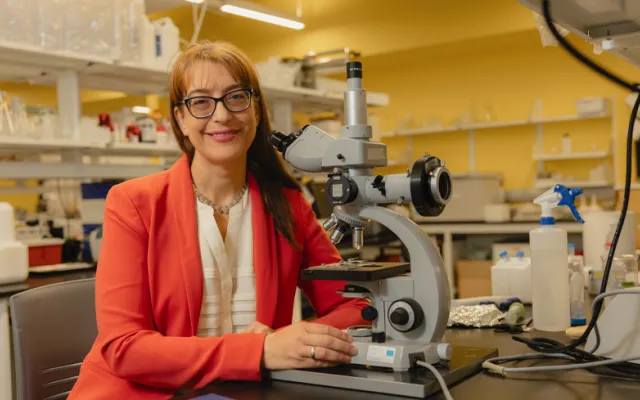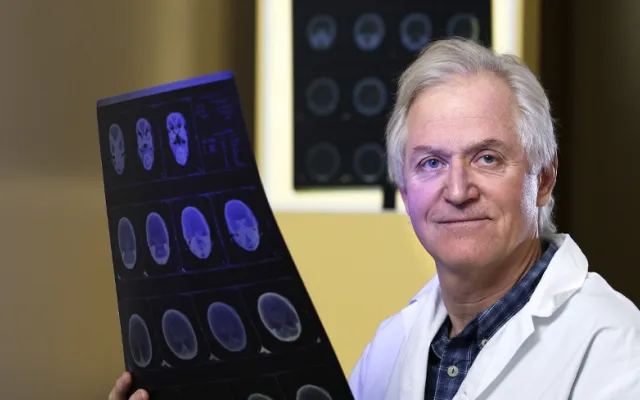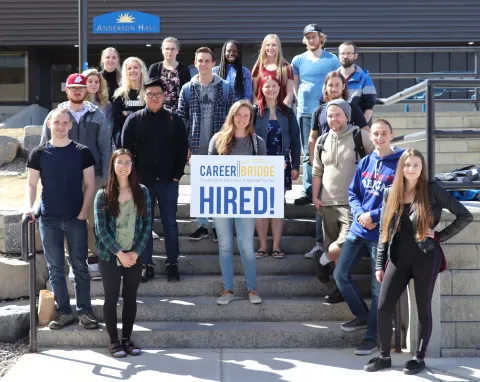Department of Neuroscience (CCBN)
LEARNING. MEMORY. COGNITION.
We are a group of neuroscientists who approach the study of the brain from the point of view of the behavioural and cognitive function of distributed neural systems.
Our Department at the University of Lethbridge was the first established neuroscience department in the country and home to some of Canada’s most famous neuroscientists. Our faculty have a wide range of interests that span topics such as memory, neuroplasticity, comparative neurology, brain development, neurodegenerative disease, recovery after injury, decision making, gambling, play, sleep and stress. And all of our faculty have national and international reputations for their work. The Department is located in the Science Commons, Canada's more advanced faility for science education and research. This new $280-million facility truly puts science on display and will inspire the next generation of researchers, entrepreneurs and leaders. With open and flexible laboratories, makerspaces and specialized outreach spaces, students from kindergarten to PhD-level, faculty and community members will have boundless opportunities for hands-on learning, collaboration and discovery.
Apply Now!
Department Highlights

Dr. Gerlinde Metz named a Canadian Academy of Health Sciences Fellow
Acknowledging her exceptional contributions to health sciences, neuroscientist Dr. Gerlinde Metz has become the University of Lethbridge’s first professor to be named a Fellow of the Canadian Academy of Health Sciences Fellow (CAHS). Fellows are recognized by their peers nationally and internationally for their contributions to health sciences and have demonstrated leadership, distinctive competencies and a commitment to advance health sciences.

University of Lethbridge researchers receive grant for further exploration into the causes of Alzheimer’s disease
Most of the research into Alzheimer’s disease has focused on the familial type where the disease has a strong genetic component. What might come as a surprise is that 90 to 95 per cent of cases are late-onset or sporadic Alzheimer’s disease (SAD), an area where researchers at the University of Lethbridge are focusing their efforts.
SAD is much more difficult to research because of the presumed interactions between genetics and lifestyle factors, which can vary from person to person. Regardless of how complicated it might be, Dr. Rob McDonald, a neuroscientist with the Canadian Centre for Behavioural Neuroscience, believes that’s precisely the direction research needs to take.

The latest weapon against Alzheimer’s disease could be as simple as touch
A study by a team of University of Lethbridge neuroscientists has shown that tactile stimulation shows much promise as a non-invasive method of slowing the onset of dementia in aging mice and could be an additional therapeutic intervention for people with Alzheimer’s disease.
January is Alzheimer’s Awareness Month and the Alzheimer Society encourages everyone to learn more about dementia and its impact on Canadians. Alzheimer’s disease (AD) is the most common form of dementia and represents a global health crisis.
Connecting Minds Through Neuroscience and Storytelling
Where theatre meets neuroscience: A one-of-a-kind class at ULethbridge
Academic Medal of the Governor General of Canada - Silver Medal (Undergraduate) Winner Hailey Slobodian
Shining Graduate Nicole Van Rootselaar
Dr. Chelsea Ekstrand, Assistant Professor, Canadian Centre for Behavioural Neuroscience
ULethbridge Alumna Jade Oldfield wins international chess award for research on executive function in at-risk youth

Put Your Knowledge to Work
Whether you’re looking for a more in-depth learning experience by assisting with research projects on campus or by testing your knowledge in a real-life work setting, we can help! The University of Lethbridge is proud to offer you an exceptional opportunity to explore professional development through academic programs and services designed to give you a competitive edge in a fast-changing world.
You have a bright future — experience it via Career Bridge at uLethbridge!
